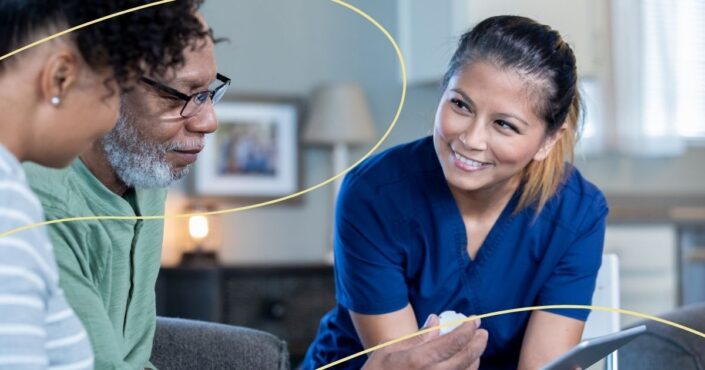Cultural competence has become a healthcare buzzword recently, but what does it mean to you as a nurse? Providing culturally competent care is important to make sure each patient feels safe and heard. It’s also a practice that ensures that all patients receive quality care, regardless of their culture, religion, sexual orientation, or disease burden (such as HIV). It allows us to work effectively in a cross-cultural group, which is essential every day in health professions.
What is cultural competence?
What exactly is cultural competence – or as it’s also known, intercultural competence or culturally competent care? Definitions may vary slightly, but in healthcare, it means acknowledging personal differences and providing care to an individual that’s in line with and respectful of their personal cultural practices or beliefs. Cultural competence is a range of behaviors and actions that leads to an interaction between two parties congruent with both individuals’ customs and traditions. The CDC has also outlined its own definition of cultural competence in the health and human services field.
Cultural competence used to be discussed solely in the context of different cultures. Now it’s used to describe care for any group of individuals who may have different access, perception, or preferences for their care, including:
- Racial or ethnic minorities
- LGBTQIA+
- People with disabilities
- Those from varied socioeconomic backgrounds
In nursing, cross-cultural care means being aware of differences and changing our methods of care specifically to benefit the patient.
How do nurses provide culturally competent care?
As a healthcare worker providing culturally competent care, you are taking an evidence-based practice, then tweaking it slightly for diverse groups of patients so that you are sensitive to their individual customs, beliefs, and traditions. Cultural competence also provides the same standard of care for patients regardless of gender identity, cultural affiliation, or race.
Acknowledging and addressing implicit bias is important when providing culturally competent care. Being aware of differences is the first place to start. This means that assessing your own attitudes or assumptions about your patients is an important starting point. Being aware and knowledgeable about different cultures, religions, and ethnicities is essential, as is staying vigilant against stereotypes. Again, talking to your patients is the best way to understand them. Developing listening skills and the ability to ask questions in a non-threatening and non-judgmental way is crucial to providing culturally competent care to patients.
As healthcare professionals, we should strive to provide culturally competent care to the best of our abilities. Four areas make up cultural competence, also known as intercultural competence:
- Awareness
- Attitude
- Knowledge
- Skills
Being culturally competent as a nurse seems simple enough, right? In practice, it is not so easy when there is little funding for research dedicated to culturally competent care for different groups and how much it improves health outcomes. We know that for BIPOC patients, cultural competence can increase access to healthcare. Still, we lack extensive studies proving these best practices. In one example, a 2003 National Academy of Medicine report showed that even when correcting for healthcare access-related factors, racial and ethnic minorities received a lower standard of care when receiving treatment for HIV. Additionally, our 2020 look at racial disparities in healthcare cited the statistic that black Americans are twice as likely to die from COVID-19 than white Americans.
Examples of cultural competence in healthcare
So how can you be sure you are providing culturally competent care? The first step is to talk to your patients and listen to what they tell you. Ask questions if there is information missing from the chart that may be useful to you. One of the easiest ways to start is by making sure a patient who needs (or wants) an interpreter has access to one, and the best choice is not necessarily a family member (unless that is their preference). We all deserve to understand how and why care is being delivered. Here is a list of examples of how to provide culturally competent care:
- Access to an interpreter if needed
- Training for staff that increases knowledge and improves awareness
- Hiring and retaining staff of different races, ethnicities, and gender identities
- Including family and community members in healthcare conversations if appropriate
- Making healthcare accessible in locations and during hours that serve a variety of patient groups
- Developing processes for ongoing evaluation of cultural competence training and updating as needed
What cultural competence is not
A common misconception is that cultural competence is synonymous with cultural sensitivity, awareness, or knowledge. In reality, you cannot have cultural competence without having those three components. Still, being culturally competent means you take it a step further and use that understanding to change how you care for an individual. Cultural or intercultural competence truly is the culmination of:
- Awareness of different cultures and values
- Knowledge of what they include
- Being sensitive to the fact that one approach does not fit all
It is also important to note that cultural competence is more about developing a skill set that is applicable across a variety of patient interactions and less about learning a list of “do’s and don’ts” for different groups of patients. The latter encourages more group stereotyping or lumping patients into broad categories by which they may not define themselves. This is why sitting down and talking with your patient is so important. Learning that skill is critical to being a culturally competent practitioner.
Cross-cultural care is really about cross-cultural communication. As you develop more tools to use in your toolbox, you better understand people from different backgrounds and address and care for them differently. Understanding how someone’s perception of and access to healthcare may differ from your own lived experience will help you better care for that individual patient and every other future patient you encounter.










thanks for this info!
Very interesting article. This is a good issue for us RN’s to be educated on.